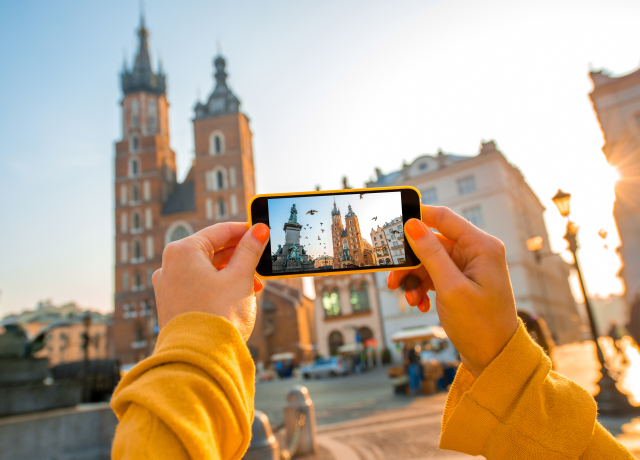European Heritage Days Article:
Discovering Heritage: The Young European Heritage Makers Activities for 2024
European Heritage Days Article:
Discovering Heritage: The Young European Heritage Makers Activities for 2024
Inspiring the Next Generation
The future of heritage lies in the hands of young people. Recognizing this, the Young European Heritage Makers Competition invites children and young people from across Europe to explore, discover, and share their local heritage with the world. This competition is more than just an opportunity to learn; it’s a chance for young people to connect with their cultural roots, express their creativity, and become active participants in the preservation of heritage.
Origins of the Young European Heritage Makers
What started in Finland as "Heritage Makers" in 2014, become in 2018 pan-European action as part of the broader European Heritage Days (EHD) program, with the aim of fostering a deeper connection between young people and their cultural heritage. By engaging youth in activities that encourage exploration and creative expression, this initiative seeks to empower the next generation to take an active role in the preservation and celebration of Europe’s rich and diverse heritage. The competition has grown over the years to become a platform where young people can not only learn about their heritage but also contribute to the shared European narrative.
Who Can Participate?
Before involving your group in the Young European Heritage Makers activities, we ask you to read the full "Young European Heritage Makers Guidelines". These guidelines provide essential information on how to participate, the roles and responsibilities of facilitators, safeguarding measures, and submission procedures. Taking the time to review these guidelines will help ensure a successful and enriching experience for all participants.
The competition is open to all young people under the age of 18 who live in the participating countries: Armenia, Croatia, Finland, Ireland, Italy, North Macedonia, Montenegro, Slovenia, Spain, Serbia, Portugal, Poland and Ukraine. There are two age categories:
- 6-11 years (children born between 2013 and 2018)
- 11-17 years (young people born between 2007 and 2013)
Whether as individuals or in groups, participants are encouraged to delve into their local surroundings, uncover stories of their heritage, and share these narratives through creative means.
How to Get Involved
Participating in the Young European Heritage Makers Competition is simple and rewarding. Here’s how you can take part:
- Organize an Activity
Begin by organizing an activity with your group under the theme "Young European Heritage Makers." This could be anything from a community event or workshop to a treasure hunt or a visit to a local heritage site. The aim is to explore and answer the question: What is your European heritage? - Present Your Findings
Once your group has completed the activity, you’ll need to present your findings. This can be done through a short video (up to 5 minutes), a photo, a painting, or another visual medium, accompanied by a brief description (no more than 800 words). - Submit Your Work
Finally, upload your group’s work to the European Heritage Days website. Be sure to include details about all participants and the facilitator guiding the project.
2024 Theme: Heritage of Routes, Networks, and Connections
For 2024, the European Heritage Days have chosen the theme Heritage of Routes, Networks, and Connections. This theme invites participants to explore the various ways in which Europe’s heritage is interconnected—whether through historical trade routes, cultural networks, or digital connections in the modern era. Participants are encouraged to consider how these connections have shaped Europe’s shared history and what stories they reveal about our common heritage.
The Role of Facilitators
As a facilitator, your role is to guide young participants in their exploration of heritage while ensuring that activities are safe, ethical, and inclusive. It’s important to encourage creativity and independence, allowing children to form their own interpretations of heritage. Facilitators should also be familiar with the Council of Europe’s child safeguarding policies, including the "Rome Strategy" (2022-2027) and the EU Strategy on the Rights of the Child.
Exploring Heritage: Key Questions
To help young participants on their journey of discovery, facilitators can pose the following questions:
- What does heritage mean to you?
- What do you know about European heritage?
- What story of Europe can you see in the heritage around you?
- What is the most interesting feature of your local heritage?
- How can you present this story in pictures and words?
These questions are designed to prompt deep reflection and encourage participants to think critically about their heritage.
Safeguarding and Consent
The safety and privacy of participants are paramount. All personal data is processed based on consent, which must be obtained according to national laws. For European winners, additional consent forms will be required for media purposes, especially for the online ceremony and any subsequent publicity.
Prizes and Recognition
The competition offers exciting rewards at both national and European levels. Nationally, the top five entries from each age category will receive special goodie bags and certificates. On the European stage, winners in the 11-17 years category will be invited to Strasbourg in 2024, where their work will be showcased in a special exhibition.
Important Dates to Remember
- 2 September 2024 – 31 December 2024: Period for organizing activities and submitting entries.
- 31 January 2025: National evaluation and selection of winners.
- February 2025: European level evaluation.
- March 2025: Announcement of European winners.
- May 2025: Strasbourg exhibition and visit for European winners in the 11-17 years category.
